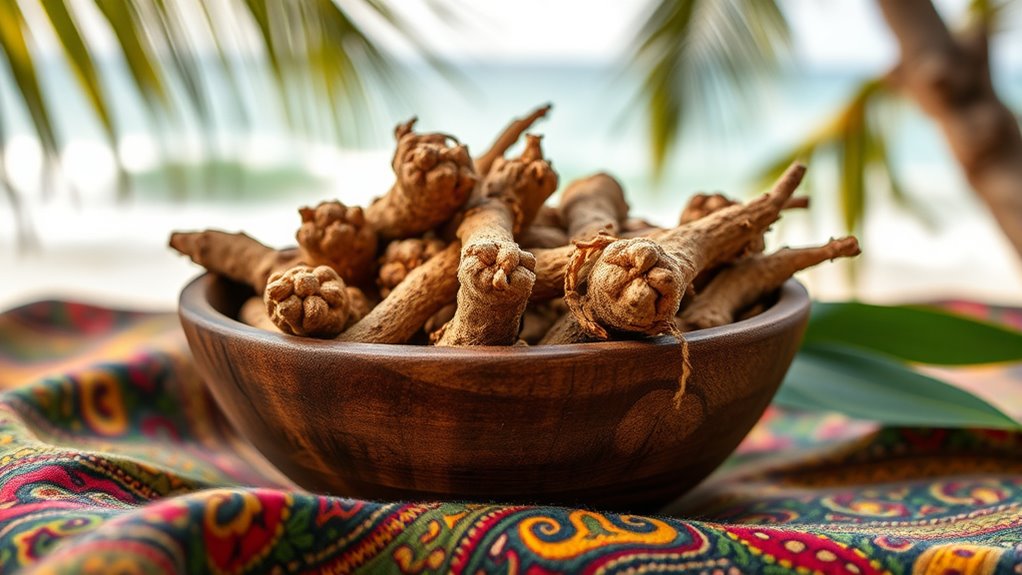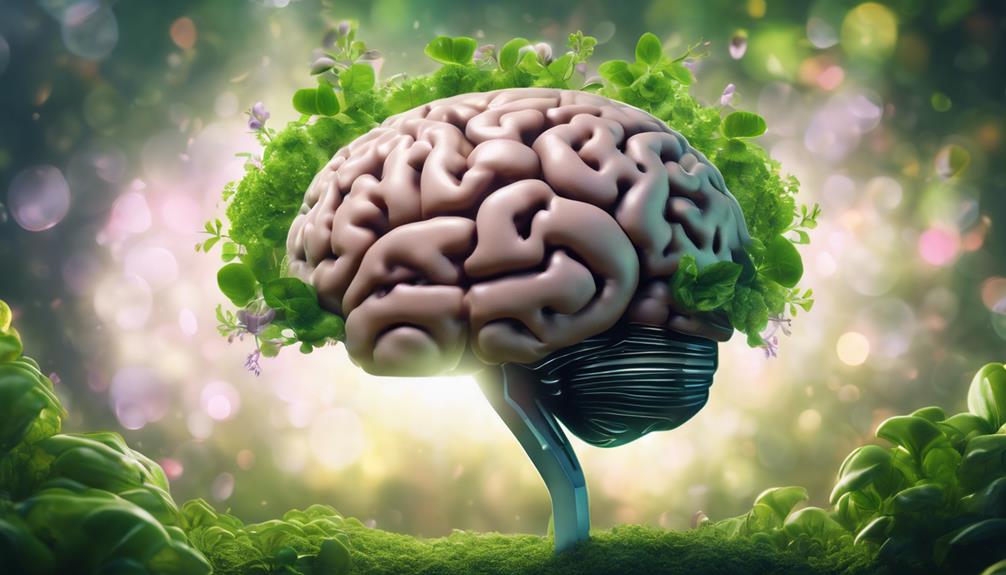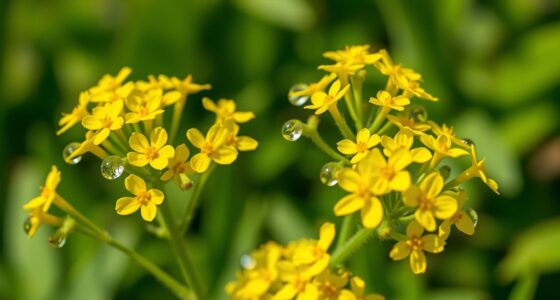Kava Kava, a traditional Pacific Island root, is widely known for its calming effects on anxiety. It interacts with the brain’s GABA receptors, promoting relaxation and easing nervousness without impairing mental clarity. Many people use it to reduce stress, improve sleep, and find emotional balance. While generally effective, it’s important to be aware of potential risks, especially with high doses. To discover how safe and helpful it might be for you, explore the details below.
Key Takeaways
- Kava Kava contains kavalactones that interact with GABA receptors, promoting relaxation and reducing anxiety.
- Traditionally used in Pacific Islander ceremonies to foster social bonds and calmness.
- Scientific studies suggest Kava can decrease nervousness without impairing cognitive function.
- Potential risks include liver issues; proper formulations and dosages are important for safe use.
- Future research aims to optimize safety and efficacy, expanding Kava’s applications for anxiety relief.
What Is Kava Kava and Where Does It Come From?
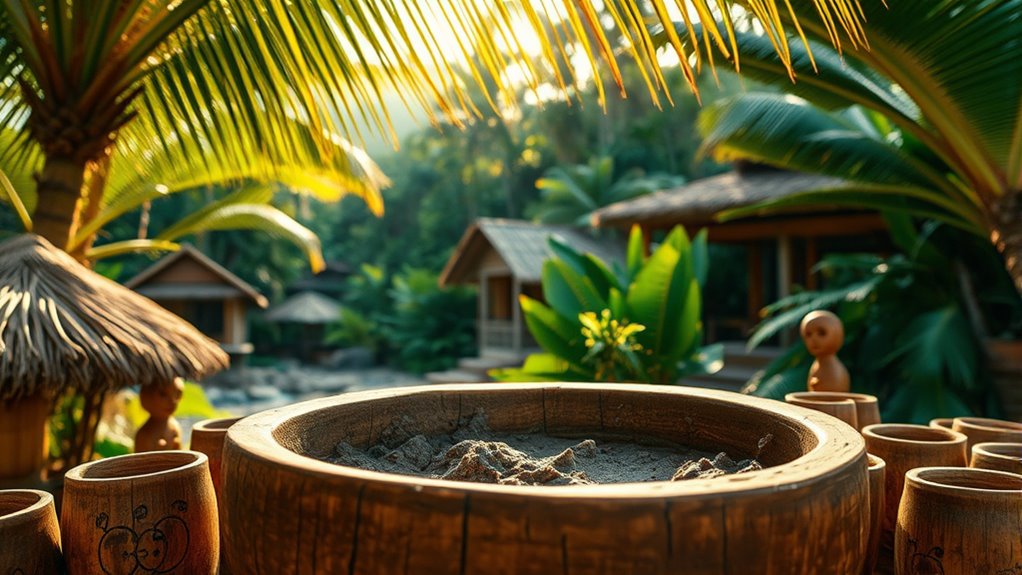
Have you ever wondered what kava kava is and where it originates? Kava kava, also known simply as kava, is a plant native to the South Pacific Islands. It’s a root known for its calming properties, traditionally prepared by extracting the active compounds from the root’s starchy parts. The indigenous peoples of places like Fiji, Vanuatu, and Tonga have used kava for centuries in social and ceremonial settings, believing it helps promote relaxation and community bonding. The plant belongs to the Piperaceae family, related to black pepper. Its unique cultural significance and natural roots make kava kava a popular herbal remedy today, especially for those seeking a natural way to ease anxiety and promote tranquility.
How Does Kava Kava Affect the Brain and Body?
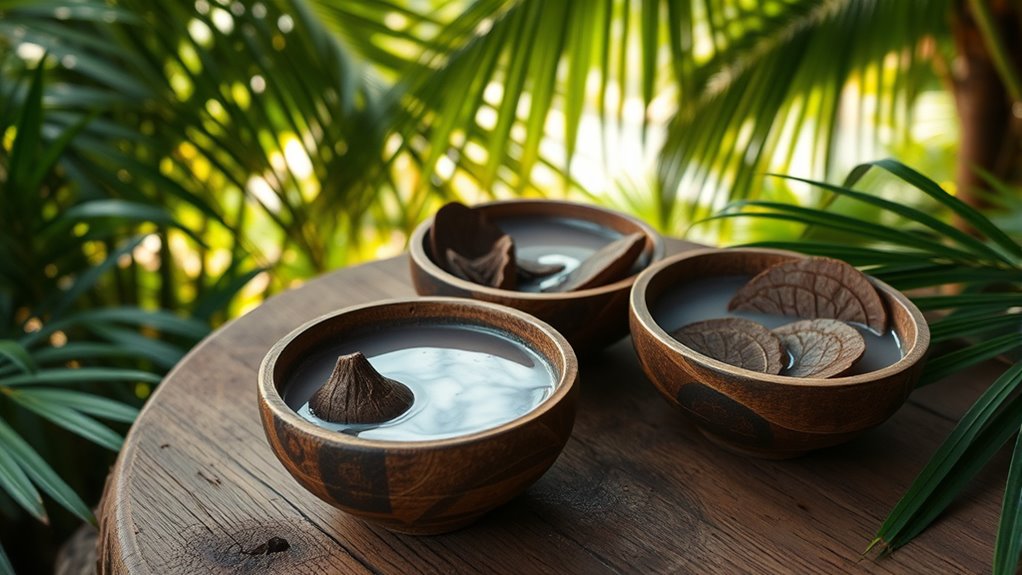
When you take kava kava, it helps relax your nerves by interacting with specific brain chemicals. This process reduces stress and promotes a calming feeling throughout your body. Understanding how it influences your neural and physiological responses can clarify its effects on anxiety relief.
Neural Relaxation Mechanisms
Kava Kava works by directly influencing the brain’s neural activity to promote relaxation. It interacts mainly with GABA receptors, which are responsible for calming neural signals. When you consume Kava, compounds called kavalactones bind to these receptors, enhancing their inhibitory effects. This action reduces neuronal excitability, helping to lower anxiety and promote a sense of calm. Additionally, Kava may modulate other neurotransmitters like dopamine and serotonin, supporting mood stabilization. As a result, your brain experiences decreased neural hyperactivity, making it easier to relax and feel less stressed. This neural relaxation mechanism is why Kava is often used to ease anxiety symptoms and induce a tranquil state without impairing mental clarity.
Physiological Impact on Stress
By influencing neural activity through GABA receptors, Kava Kava not only promotes relaxation but also triggers physiological changes that reduce stress levels. It lowers heart rate, relaxes muscles, and decreases cortisol production, helping your body respond calmly to stressors. These effects are due to kava’s active compounds, called kavalactones, which modulate brain activity and calm the nervous system. Here’s a closer look:
| Effect | Mechanism | Result |
|---|---|---|
| Reduced Heart Rate | GABA receptor activation | Calmer cardiovascular response |
| Muscle Relaxation | Central nervous system influence | Less physical tension |
| Cortisol Reduction | Hormonal regulation | Lower stress hormone levels |
| Improved Sleep | Sedative properties | Restorative rest |
| Anxiety Decrease | Neurochemical modulation | Enhanced emotional stability |
The Traditional Uses and Cultural Significance of Kava Kava

You’ll find that kava kava plays a central role in many Pacific Islander ceremonies and gatherings. It’s more than just a drink; it embodies cultural beliefs and social bonds. Understanding its traditional uses helps you appreciate its deeper cultural significance.
Ceremonial Rituals and Practices
Throughout many Pacific Island cultures, ceremonial rituals involving kava kava hold deep spiritual and social significance. When you participate in these rituals, you become part of a tradition that fosters unity, respect, and communal bonding. Typically, you’ll gather in a designated space, sitting on the ground, as elders or community leaders prepare the kava drink. The preparation process is ceremonial, often involving specific chants or prayers to honor the roots and invoke spiritual blessings. Drinking kava together signifies trust and friendship, creating a sense of harmony among participants. These rituals are not just about socializing—they serve as a way to connect with ancestors, seek guidance, or mark important events. By engaging in these practices, you honor a deeply rooted cultural heritage that emphasizes respect, community, and spiritual connection.
Cultural Significance and Beliefs
Kava kava holds a profound place in the cultural fabric of Pacific Island communities, where it’s more than just a drink—it embodies tradition, spirituality, and social cohesion. You’ll find it central to ceremonies, gatherings, and rites of passage, symbolizing respect and unity. For centuries, locals believe kava promotes harmony, relieves stress, and connects people to their ancestors and spiritual domains. Its preparation and consumption follow strict protocols, reflecting deep-rooted customs and values. In many communities, kava is seen as a sacred gift from nature, deserving reverence and careful handling. Its cultural significance underscores a collective identity, emphasizing community bonds and spiritual well-being. To these societies, kava isn’t merely a beverage but a essential part of their cultural heritage and beliefs.
Potential Benefits of Using Kava Kava for Anxiety Relief
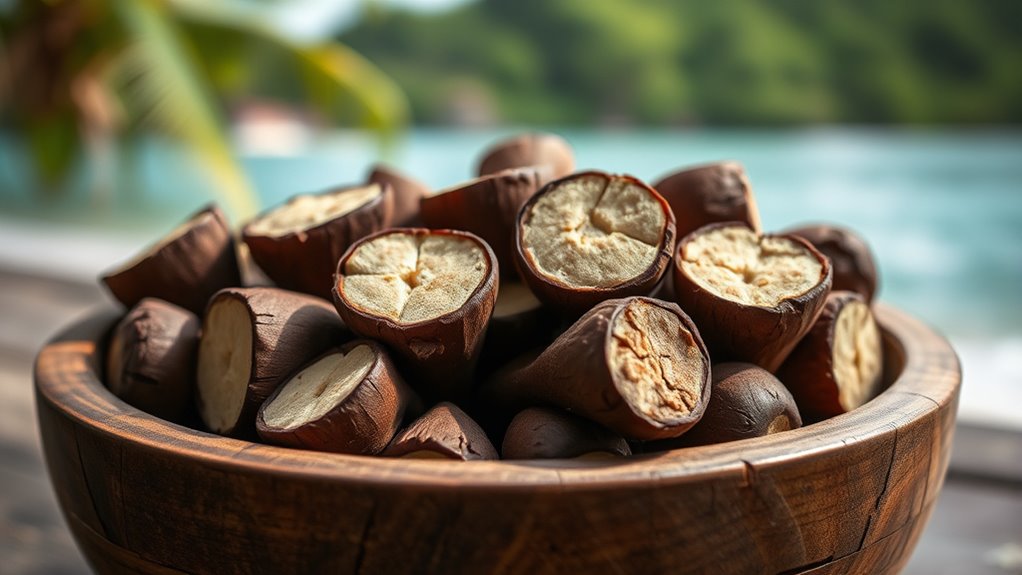
Many people turn to kava kava because it offers promising relief from anxiety symptoms. Its natural compounds, called kavalactones, interact with your brain’s receptors to promote relaxation and reduce stress. Unlike some medications, kava provides calming effects without causing drowsiness or impairing mental clarity. Many users report feeling more at ease, with decreased feelings of tension and nervousness. Kava may also help improve sleep quality, which is often disrupted by anxiety. Its soothing properties can make daily stresses more manageable, enhancing your overall sense of well-being. While individual responses vary, many find that kava offers a gentle, natural option to help calm their nerves and regain control over anxious feelings.
Possible Risks and Side Effects of Kava Kava Consumption
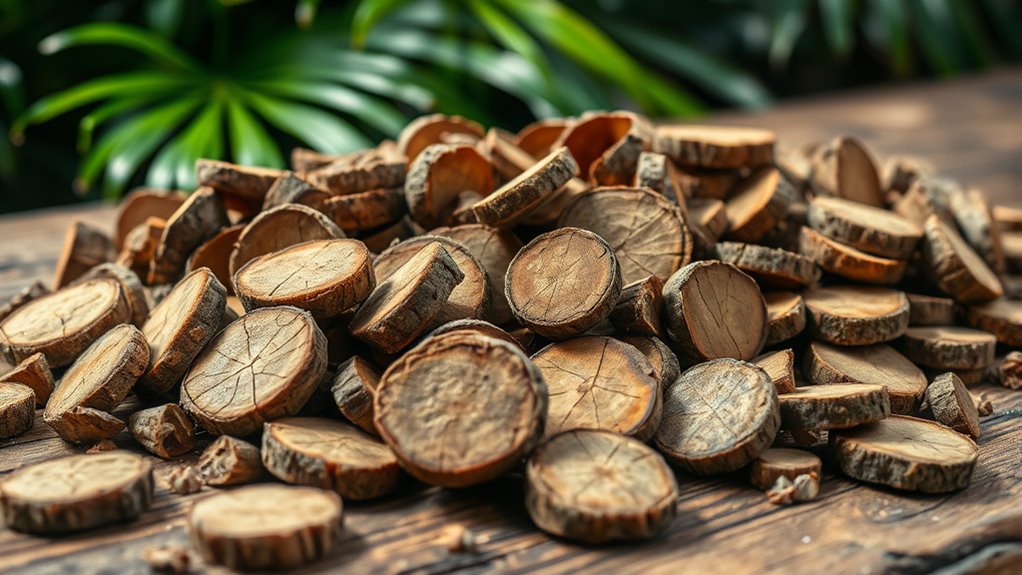
While kava kava can offer calming benefits for anxiety, it’s important to be aware of its potential risks and side effects. Some people may experience liver issues, including severe damage, especially with high or prolonged use. You might also face symptoms like dizziness, nausea, or allergic reactions such as skin rashes. In rare cases, kava can cause neurological effects like tremors or vision problems. To minimize risks, avoid combining kava with alcohol or other sedatives. Always consult your healthcare provider if you have liver problems or are on medication. Remember, even natural remedies can pose health hazards if misused or taken in excess. Being informed helps you make safer choices while exploring kava’s calming potential.
How to Safely Incorporate Kava Kava Into Your Wellness Routine
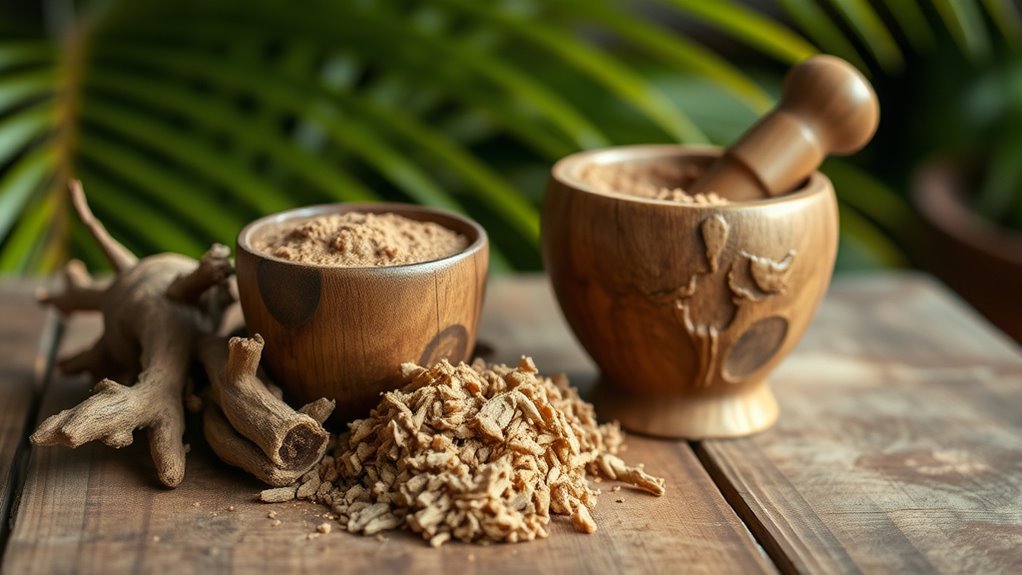
To safely incorporate kava kava into your wellness routine, start by consulting a healthcare professional to guarantee it’s appropriate for your individual health needs. They can advise you on proper dosages and warn you of potential interactions with medications or health conditions. Begin with a low dose to assess your body’s response, and always follow product instructions carefully. Opt for reputable brands that use standardized extracts to ensure quality and safety. Limit your use to short-term periods, avoiding daily long-term consumption unless directed by a healthcare provider. Stay mindful of your body’s signals, and discontinue use if you experience any adverse effects. Combining kava kava with other relaxation techniques, like meditation or exercise, can enhance its calming benefits safely.
Current Research and Future Perspectives on Kava Kava
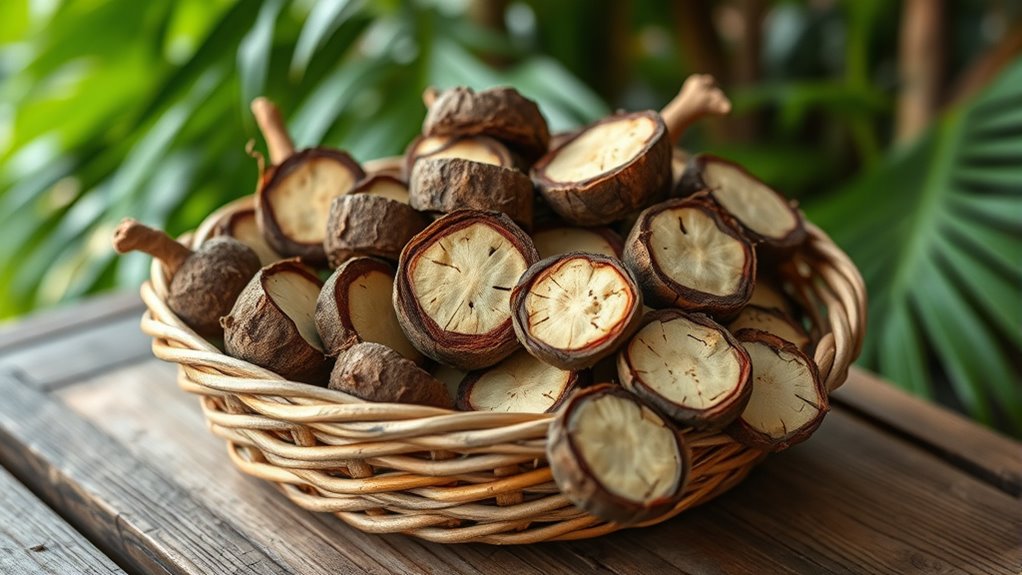
Recent studies are increasingly exploring the potential of kava kava as a natural remedy for anxiety, focusing on its active compounds and their effects on the nervous system. Researchers are examining how kava’s kavalactones interact with neurotransmitter receptors to promote relaxation without impairing cognitive function. Future research aims to clarify ideal dosages, long-term safety, and different preparation methods. As the scientific community advances, you’ll see developments like:
- Enhanced formulations with standardized active compounds
- Better understanding of safety profiles and interactions
- Potential new applications beyond anxiety, such as sleep aid or stress management tools
Frequently Asked Questions
Are There Any Known Interactions Between Kava Kava and Prescription Medications?
Yes, there are known interactions between kava kava and prescription medications. You should be cautious because kava can enhance sedative effects of drugs like benzodiazepines, sleep aids, and antidepressants, increasing drowsiness or dizziness. It may also affect liver enzymes, altering how your body processes certain medications. Always consult your healthcare provider before combining kava kava with any prescription drugs to avoid potential adverse effects.
How Long Does It Take to Feel the Effects of Kava Kava?
You’ll typically start to feel the effects of kava kava within 20 to 30 minutes after consuming it. If you take it as a tea or supplement, expect the calming sensations to develop gradually. Keep in mind that individual responses vary based on factors like your body weight, metabolism, and the form of kava you use. It’s best to start with a small dose to gauge your reaction.
Can Kava Kava Be Used to Treat Chronic Anxiety Long-Term?
You can use kava kava for long-term anxiety management, but it’s important to do so carefully. While it may help reduce symptoms over time, prolonged use can lead to liver issues and other health concerns. You should consult a healthcare professional before incorporating kava kava into your routine, especially if you have existing health conditions or take medications. Monitor your response closely and prioritize safer, well-established treatments for chronic anxiety.
What Are the Recommended Dosages for Safe Kava Kava Use?
Think of dosage guidelines as a gentle sailboat steering calm waters—steady and cautious. For safe kava kava use, stick to 60-120 mg of kavalactones per day, divided into two or three doses. Beginners should start with lower amounts and gradually increase, always consulting a healthcare professional. Avoid exceeding recommended doses to prevent adverse effects, and never use it with alcohol or other sedatives.
Is There a Difference Between Traditional and Commercial Kava Kava Preparations?
Yes, there’s a difference. Traditional kava preparations often use fresh or dried roots prepared by grinding and steeping, maintaining the plant’s natural potency. Commercial products, however, typically come in capsules, teas, or extracts, which may contain standardized or concentrated forms. These variations can affect the strength and effects. Always check product labels and choose reputable sources to guarantee quality and safety.
Conclusion
While kava kava has been used for centuries to soothe nerves, it’s wise to approach it as your modern-day elixir with caution. Think of it as your trusty potion, but remember, even the most magical herbs can have side effects. Before you set out on this herbal adventure, consult with a healthcare professional. Just like ancient mariners relied on their stars, trust scientific research to guide your journey toward calmer days.

